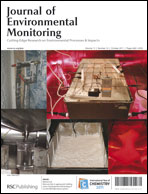The fate of micropollutants throughout wastewater treatment systems is highly dependent on their sorption interactions with sludge matter. In this study, both the sorption and desorption kinetics of polycyclic aromatic hydrocarbons (PAHs) in activated sludge were shown to be very rapid in comparison to biodegradation kinetics. It was concluded that PAH transfer does not limit their biodegradation and that their fate is governed by the sorption/desorption equilibrium state. The effect of contact time between sludge and PAHs was also investigated. It was shown that aging did not influence the sorption/desorption equilibrium although PAH losses during aging suggest that sequestration phenomena had occurred. This implies that for PAH sorption assessment within treatment processes there is no need to include a contact time dimension. As a consequence, thanks to an innovative approach taking into account sorption equilibria and sequestration, this work has demonstrated that studies in the literature which, in main, deal with micropollutant sorption in sewage sludge with only a short contact time can be extrapolated to real systems in which sorption, desorption and aging occur.

You have access to this article
 Please wait while we load your content...
Something went wrong. Try again?
Please wait while we load your content...
Something went wrong. Try again?


 Please wait while we load your content...
Please wait while we load your content...